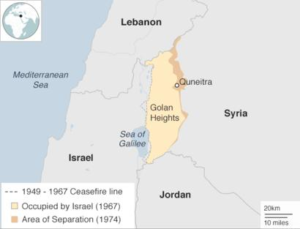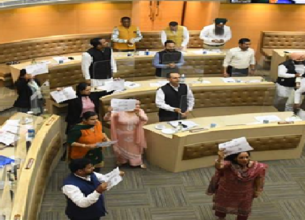PRELIM SNIPPETS – December 27th 2021
1. Golan Heights
Why in News?
- Israeli Prime Minister Naftali Bennett recently said the country intends to double the number of settlers living in the Israeli-controlled Golan Heights with a multimillion-dollar plan meant to further consolidate Israel’s hold on the territory it captured from Syria more than five decades ago.
About:
- The Golan Heights is a rocky plateau with an area of 1,800km² on the border between Israel and Syria in south-western Syria.
- Israel occupied the Golan Heights, West Bank, East Jerusalem, and the Gaza Strip in the 1967 Six-Day War. An armistice line was established and the region came under Israeli military control.
- Syria tried to retake the Golan Heights during the 1973 Middle East war. Syria was defeated in its attempt.
- Both countries signed an armistice in 1974 and a UN observer force has been in place on the ceasefire line since 1974.
- In 1981, Israel permanently acquired the territory of the Golan Heights and East Jerusalem in moves never Recognized by Most Countries.
- The international community regards as disputed territory occupied by Israel whose status should be determined by negotiations between Israel and Syria.
- Attempts by the international community to bring Israel and Syria for negotiations have Failed.

2.Centre declares Soya Meal as an Essential Commodity
Why in News?
- In a bid to cool down the domestic prices of Soya Meal, Government has notified order under the Essential Commodities Act to declare ‘Soya Meal’ as Essential Commodities under the Essential Commodities Act, 1955.
Essential Commodities Act:
- The ECA, 1955 was established to ensure the delivery of certain commodities or products, the supply of which, if obstructed due to hoarding or black marketing, would affect the Normal Life of the people.
- The list of items under the Act includes drugs, fertilizers, pulses, and edible oils, as well as Petroleum and Petroleum Products.
- The Centre can include New Commodities as and when the need arises, and takes them off the list once the Situation Improves.
- Additionally, the government can also fix the maximum retail price (MRP) of any packaged product that it declares an “essential commodity”.
How ECA works?
- Centre Notifying Stock Limit Holding:
- If the Centre finds that a certain commodity is in short supply and its price is spiking, it can notify stock-holding limits on it for a specified period.
- The States act on this notification to specify limits and take steps to ensure that these are adhered to.
- Anybody trading or dealing in the commodity, be it wholesalers, retailers or even importers are prevented from stockpiling it beyond a certain quantity.
- States can opt-out:
- A State can, however, choose not to impose any restrictions.
- But once it does, traders have to immediately sell into the market any stocks held beyond the Mandated Quantity.
- What happens for non-compliance?
- As not all shopkeepers and traders comply, State agencies conduct raids to get everyone to toe the line and the errant are punished.
- The excess stocks are auctioned or sold through fair price shops.
- This improves supplies and brings down prices.
What about Food Items?
- Items covered:
- Rice, wheat, atta, Gram Dal, Arhar Dal, moong dal, urad dal, masoor, dal, tea, sugar, salt, Vanaspati, groundnut oil, mustard oil, milk, soya oil, palm oil, sunflower oil, gur, potato, onion and tomato.
- Price Stabilization Fund (PSF):
- The government utilizes the buffer of agri-horticultural commodities like pulses, onion, etc. built under Price Stabilization Fund (PSF) to help moderate the volatility in prices.
Recent amendments to the ECA:
- In 2020, the EC Act was amended for the stock limit to be imposed only under exceptional Circumstances such as famine or other Calamities.
- Exceptional Circumstances: It allowed the centre to delist certain commodities as essential, allowing the Government to regulate their supply and prices only in cases of war, famine, Extraordinary Price rises, or Natural Calamities.
- Commodities de-regulated: The commodities that have been deregulated are food items, including cereals, pulses, potatoes, onion, edible oilseeds, and oils.
Exceptions Provided:
- The Government regulation of stocks will be based on rising prices, and can only be imposed if there is
- A 100% increase in retail price in the case of horticultural produce and
- A 50% increase in retail price in the case of non-perishable agricultural food items
- These restrictions will not apply to stocks of food held for public distribution in India.
3.Meendum Manjappai Scheme
Why in News?
- Tamil Nadu CM has launched the ‘Meendum Manjappai’ Scheme to promote the use of cloth bags by the public and discourage the use of plastic bags.
Meendum Manjappai Scheme:
- This awareness campaign on using ‘yellow’ cloth bag or ‘manjapai’ as it is called in Tamil, is aimed at encouraging the people to return to the use of this eco-friendly bag and discard the plastic bags.
- Manjal means turmeric in Tamil which has curative power. The manjapai was an integral part of daily life in the past.
- Traditionally the manjapais were used for shopping, carrying books, ration and even cash.
- The state government had enforced a ban on the production, use, storage, distribution, transportation or sale of 14 types of plastics with effect from January 1, 2019.
4.Bottom Trawling
Why in News?
- Recently, Sri Lankan authorities between December 18 and 20 and the impounding of 10 boats for “poaching” in territorial waters have again raised concerns about the fate of the Men.
Highlights:
- Fishermen from Tamil Nadu getting arrested and released later has become a routine affair, but there have been cases of deaths
- The bone of contention between the two countries has been the use of bottom trawlers by the Tamil Nadu fishermen, a practice opposed in Sri Lanka’s Northern Province on the ground that trawling damages the marine ecosystem.
- This practice has been banned in Sri Lanka and there have been agitations for stringent Enforcement of the law.
- The Indian side had agreed twice — in 2010 and 2016 — to phase out and end the practice of bottom trawling. But it has not ended yet.
- Bottom trawling, an ecologically destructive practice, involves trawlers dragging weighted nets along the sea-floor, causing great depletion of aquatic resources.
- Bottom trawling captures juvenile fish, thus exhausting the ocean’s resources and affecting marine conservation efforts. This practice was started by Tamil Nadu fishermen in Palk Bay and actively pursued at the peak of the civil war in Sri Lanka.
5.Flex Fuel vehicles
Why in News?
- Recently, Union Minister of Road Transport and Highways, Nitin Gadkari, has for long been advocating the use of flex-fuel to power cars and motorcycles sold in India.
Highlights:
- At an industry event, the transport minister revealed that he has issued an advisory to all carmakers to introduce flex-fuel Engines in their Vehicles.
As per the Advisory Issued by the Government:
- Carmakers are given six months’ time to introduce flex-fuel engines.
- Manufacturers have to produce the Flex Fuel Strong Hybrid vehicles and both types of vehicles must comply with the BS-6 emission norms.
- An FFV is a modified version of vehicles that could run both on gasoline and doped petrol with different levels of ethanol blends.
- FFVs will allow vehicles to use all the blends and also run on unblended fuel.
- FFVs have compatible engines to run on more than 84 percent ethanol blended petrol.
Advantages
- FFVs are aimed at reducing the use of polluting fossil fuels and cutting down harmful emissions.
- Alternative fuel ethanol is Rs 60-62 per litre while petrol costs more than Rs 100 per litre in many parts of the country, so by using ethanol, Indians will save Rs 30-35 per litre.
- For India, FFVs will present a different advantage as they will allow vehicles to use different blends of ethanol mixed petrol available in different parts of the country.
- Also, these vehicles are a logical extension of the Ethanol Blended Petrol (EBP) programme launched by the Union Ministry of Petroleum and Natural Gas in January 2003.
- Since India has surplus produce of corn, sugar and wheat, the mandatory blending of ethanol programme will help farmers in realising higher incomes.
- For the overall Indian economy, higher usage of ethanol as an automobile fuel will help save import costs as the country meets more than 80 per cent of its crude oil requirements through imports.
6.Special Category Status (SCS)
Why in News:
- Recently, The government has informed the Lok Sabha that it has extended a special package in lieu of the Special Category Status (SCS) to Andhra Pradesh.
Highlights:
- An amount of ₹19,846.199 crore under the Andhra Pradesh Reorganisation Act, 2014.
- As per the recommendations of the respective Finance Commissions, Revenue Deficit Grant of ₹22,112 crore for 2015-20 and ₹5,897 crore for 2020-21 had been released.
- The special assistance measure would make up for the additional Central share the State might have received during 2015-16 to 2019-20, if the funding of Centrally Sponsored Schemes (CSS) would have been shared at the ratio of 90:10 between the Centre and the State.
- Andhra Pradesh has revived its demand for Special Category Status (SCS).
- It was the bifurcation promise and 15th Finance Commission report that stated that ‘grant of SCS lies in the hands of the Centre’. SCS was promised to Andhra Pradesh by the then Congress government at the Centre in 2014, at the time of bifurcation which resulted in the formation of Telangana.
- The then Opposition party BJP too agreed to it and even stated that SCS would be extended by five more years if it was voted to power.
- There is no provision of SCS in the Constitution; the Central government extends financial assistance to states that are at a comparative disadvantage against others.
- This classification was done on the recommendations of the Fifth Finance Commission in 1969.
- It was based on the Gadgil formula. The parameters for SCS were:
- Hilly Terrain
- Low Population Density / Sizeable Share of Tribal Population
- Strategic Location along Borders With Neighbouring Countries
- Economic and Infrastructure Backwardness; and
- Nonviable Nature of State finances.







